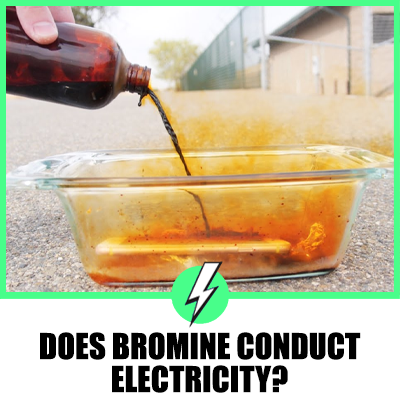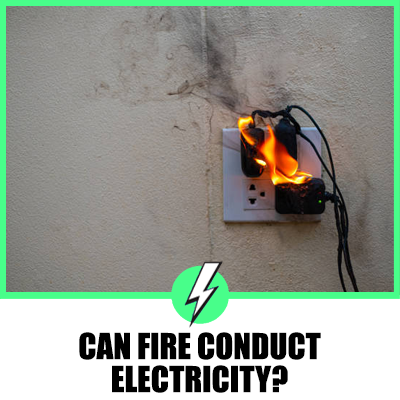Does Bromine Conduct Electricity?
The world of chemistry is full of intriguing properties.
One element, bromine, stands out due to its distinct brown colour.
It’s also one of the only two elements that exist as a liquid at room temperature.
But what about its electrical properties?
Does bromine conduct electricity?
Is bromine a good conductor of electricity or is it a bad conductor?
Let’s find out.

Contents
Is Bromine a Good Conductor of Electricity?
Here’s the truth:
Bromine is not a good conductor of electricity.
And why is that?
The answer lies in its nature.
Bromine is a non-metal. And non-metals lack the properties required for efficient electrical conduction.
Electricity conduction involves the movement of free electrons or ions.
Metals have a ‘sea’ of delocalized electrons that move freely, facilitating conduction.
Bromine, being a non-metal, does not have these free electrons or ions. This makes it a poor conductor.
Why Doesn’t Bromine Conduct Electricity?
Let’s get a bit more specific.
Bromine atoms have seven valence electrons.
They tend to gain an electron to complete their outermost energy level, becoming bromide ions.
However, these ions aren’t freely available in pure bromine, which means that no current can flow.
Further, bromine exists as a diatomic molecule, Br2.
This implies two bromine atoms bond together to share a pair of electrons.
This type of bonding, known as covalent bonding, does not facilitate the flow of electricity.
This is because there are no free-moving charge carriers.
Is Bromine a Bad Conductor of Electricity?
This question might seem straightforward, but it’s not.
When we say bromine is a bad conductor of electricity, we mean in its pure, unaltered state.
However, there are certain conditions that can alter bromine’s conductivity.
For example, when bromine is dissolved in water to form a solution, the bromine molecules can dissociate into ions.
These ions can carry an electrical charge, making the solution a better conductor than pure bromine.
However, this level of conductivity is still much lower than metals.
Hence, we say bromine is a ‘bad’ conductor.
Is Bromine a Conductor or Insulator?
This brings us to another important question:
Is bromine a conductor or an insulator?
Generally, bromine is classified more as an insulator than a conductor.
Remember, conductivity is a spectrum.
On one end, you have good conductors like metals. On the other, you have insulators like rubber.
In its standard state, bromine falls closer to the insulator end of this spectrum.
Insights from Online Discussions
Online discussions are full of debates on this topic.
On Quora, one discussion revolves around why bromine can’t conduct electricity.
The consensus? It’s due to the lack of free electrons and the atomic structure of bromine.
A similar debate on Answers asks if liquid bromine can conduct electricity.
The general agreement? It doesn’t, unless ions or impurities are introduced.
Finally, over at Blurtit, the discussion focuses on bromine’s potential to become ionic when dissolved.
The takeaway? While bromine isn’t a great conductor, its conductivity can be improved under specific conditions.
Wrapping Up
Bromine is not a good conductor of electricity.
This is due to its atomic structure and the absence of free electrons or ions.
While certain conditions can improve its conductivity, bromine is generally seen as a poor conductor or an insulator.
These findings align with insights from various online discussions.





